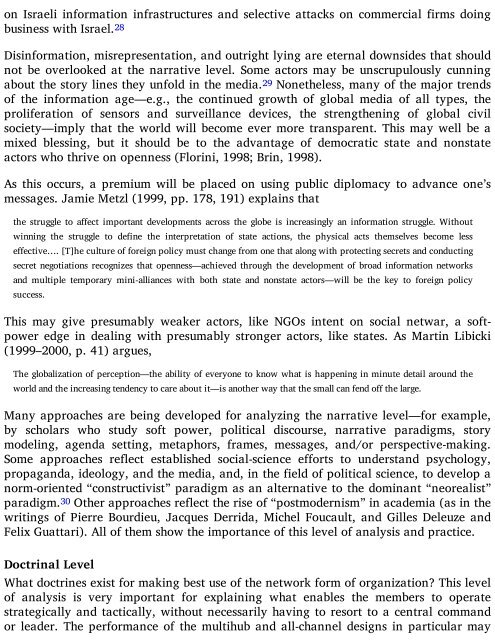RAND_MR1382
You also want an ePaper? Increase the reach of your titles
YUMPU automatically turns print PDFs into web optimized ePapers that Google loves.
on Israeli information infrastructures and selective attacks on commercial firms doing<br />
business with Israel. 28<br />
Disinformation, misrepresentation, and outright lying are eternal downsides that should<br />
not be overlooked at the narrative level. Some actors may be unscrupulously cunning<br />
about the story lines they unfold in the media. 29 Nonetheless, many of the major trends<br />
of the information age—e.g., the continued growth of global media of all types, the<br />
proliferation of sensors and surveillance devices, the strengthening of global civil<br />
society—imply that the world will become ever more transparent. This may well be a<br />
mixed blessing, but it should be to the advantage of democratic state and nonstate<br />
actors who thrive on openness (Florini, 1998; Brin, 1998).<br />
As this occurs, a premium will be placed on using public diplomacy to advance one’s<br />
messages. Jamie Metzl (1999, pp. 178, 191) explains that<br />
the struggle to affect important developments across the globe is increasingly an information struggle. Without<br />
winning the struggle to define the interpretation of state actions, the physical acts themselves become less<br />
effective…. [T]he culture of foreign policy must change from one that along with protecting secrets and conducting<br />
secret negotiations recognizes that openness—achieved through the development of broad information networks<br />
and multiple temporary mini-alliances with both state and nonstate actors—will be the key to foreign policy<br />
success.<br />
This may give presumably weaker actors, like NGOs intent on social netwar, a softpower<br />
edge in dealing with presumably stronger actors, like states. As Martin Libicki<br />
(1999–2000, p. 41) argues,<br />
The globalization of perception—the ability of everyone to know what is happening in minute detail around the<br />
world and the increasing tendency to care about it—is another way that the small can fend off the large.<br />
Many approaches are being developed for analyzing the narrative level—for example,<br />
by scholars who study soft power, political discourse, narrative paradigms, story<br />
modeling, agenda setting, metaphors, frames, messages, and/or perspective-making.<br />
Some approaches reflect established social-science efforts to understand psychology,<br />
propaganda, ideology, and the media, and, in the field of political science, to develop a<br />
norm-oriented “constructivist” paradigm as an alternative to the dominant “neorealist”<br />
paradigm. 30 Other approaches reflect the rise of “postmodernism” in academia (as in the<br />
writings of Pierre Bourdieu, Jacques Derrida, Michel Foucault, and Gilles Deleuze and<br />
Felix Guattari). All of them show the importance of this level of analysis and practice.<br />
Doctrinal Level<br />
What doctrines exist for making best use of the network form of organization? This level<br />
of analysis is very important for explaining what enables the members to operate<br />
strategically and tactically, without necessarily having to resort to a central command<br />
or leader. The performance of the multihub and all-channel designs in particular may










![Genki - An Integrated Course in Elementary Japanese II [Second Edition] (2011), WITH PDF BOOKMARKS!](https://img.yumpu.com/58322134/1/180x260/genki-an-integrated-course-in-elementary-japanese-ii-second-edition-2011-with-pdf-bookmarks.jpg?quality=85)
![Genki - An Integrated Course in Elementary Japanese I [Second Edition] (2011), WITH PDF BOOKMARKS!](https://img.yumpu.com/58322120/1/182x260/genki-an-integrated-course-in-elementary-japanese-i-second-edition-2011-with-pdf-bookmarks.jpg?quality=85)





